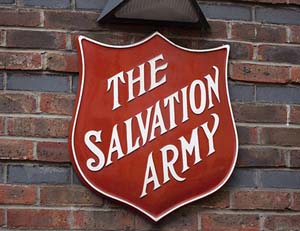New CRM helps the Salvos stay in front

The Salvation Army helps thousands of Australians each year, but when it looked at its customer relationship management (CRM) system the charity realised it needed some help of its own.

(The Salvation Army image by
William Murphy, CC BY-SA 2.0)
The Salvos wanted to develop an integrated system to manage its relationships with supporters and simplify its east-coast fundraising operations in Queensland, the ACT and New South Wales.
Supporter relationship management program director for The Salvation Army, John Herring, said one of the biggest issues with the previous system was its lack of functionality, which made the task of analysing all the information the charity had collected daunting.
"We moved from an in-house built database system that had been built by using contractors to come in and write the programming etcetera," he said.
"It was basically designed to facilitate receiving and processing of donations and to run a mailing appeal from it to get data and export it for a mailing campaign. But whilst it had that, it had very little functionality for analysis, so analysis became tedious."
The organisation needed a system that would allow it to put all the data it collected to good use, and build relationships with its supporters.
To do this, the charity implemented a CRM system from StayinFront, which included CRM and analytics, eBusiness, opportunity management and Marketing Center.
The implementation began in late 2007, with the first phase completed by July 2008. "By change of financial year we rolled into the new system," Herring said, but the implementation still had a long way to go; the charity is still putting the finishing touches onto the StayinFront-based system.
"We're just about complete now; there's a few little modifications and refinements going on now," Herring said. This year's Salvation Army Door Knock appeal in May allowed testing of the recently implemented Door Knock module, which aimed to simplify the charity's distribution of volunteers and management of donations from the day.
During the Door Knock appeal, the new CRM allowed for better visibility of volunteers participating. "We were able to register volunteers through various means; through the web, through phoning in, from committee enlistment etcetera, and all that information was able to be put into the system so we could record our volunteers and know ahead of time who we had collecting in a particular area."
The work isn't over, however, as the door knock showed where the organisation could do some more tweaking. "There are some refinements that will come into the system as a result of the knowledge gained in that process," he said
StayinFront has also allowed the charity to change its culture, moving from a single-dimensional "donor" system focused on donations, to a multidimensional view of "supporters", encouraging people to get more involved with the charity by volunteering, making donations and assisting the charity's works.
Yet developing and maintaining relationships with over a million supporters is no easy task.
"One of the issues for the Salvation Army is that when our officers get appointed from one role to another, it means that the relationships built at the local level need to be transferred to the new person coming into a role so that relationship building activities can keep going," Herring said.
With the new CRM, the Salvation Army has been able to manage these relationships and keep both donations and volunteers coming in. "We've seen an approximately 15 per cent increase in our rate of retention of supporters. That is a huge benefit to the organisation over time of being able to keep supporters working with us and not have a high level of attrition."
In the future, the new system may be rolled out across more areas of the business than just the eastern territories. "Other parts of The Salvation Army in other territories are looking at what we've done, and it may in time enhance the work of The Salvation Army in a wider sense and not just in our area of operations."